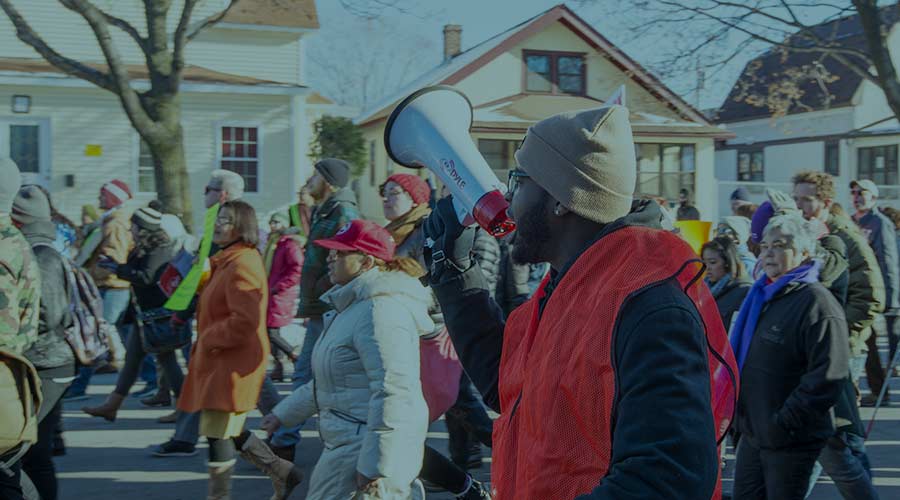To date, 45 state legislatures and governors have passed, attempted to pass or are currently in the process of passing so-called “anti-riot” bills, according to the International Center for Not-for-Profit Law (INCL). These are laws that would place limits on how citizens are allowed to gather to voice opinions and/or oppose the status quo. And, although the laws carefully avoid language targeting specific groups, the policies lay heavy penalties on protesters and many give police “broad discretion” to determine if a group is in violation of the law, according to the ACLU. For example, if the definition of a “riot” is made to be overly broad, it could include people marching in a peaceful protest nearby. The marchers could then be charged for violence or damages they did not cause, intend or even witness.
Nicholas Robinson, a legal advisor for the INCL, told Law360 news website that the number of bills constitute a “spike” in legal activity as legislators respond with policies to prevent future marches like the Black Lives Matter protests held during the summer of 2020.
According Law360, data gathered by Boston University professor Karen Pita Loor shows that discrimination by police regarding protesters was apparent during last summer’s racial justice protests. The marches were diverse but people of color were more likely to accrue higher penalties. For example, in New York City following George Floyd’s death, only 15.7% of those arrested in connection to the protests were charged with a felony, compared to 3.5% of whites. The data comes from the New York Attorney General’s Office.
These new protest restrictions are coming to states in every region of the country. Data compiled by the INCL shows that 36 laws have been enacted in 20 states to curb protesters including: Alabama, Arkansas, Florida, Indiana, Iowa, Kansas, Kentucky, Louisiana, Mississippi, Missouri, Montana, North Dakota, Ohio, Oklahoma, South Dakota, Tennessee, Texas, Utah, West Virginia and Wisconsin.
Florida Takes the Lead in Anti-Protest Legislation
Florida Governor Ron DeSantis recently signed into law HB 1, the “Combating Violence, Disorder and Looting and Law Enforcement Protection Act.” HB 1 muddies the definition of what constitutes a protest under Florida state law. The new law also requires those arrested to remain in jail until they have a court hearing, in direct contradiction of the Constitution’s right to due process under the fifth amendment.
The NAACP called the bill, “racist, discriminatory, unwise, unlawful, and unjust.”
ACLU of Florida Executive Director Micah Kubic began his statement denouncing the bill saying that the law criminalizes peaceful protests and would negatively impact minorities.
“Each and every provision harkens back to Jim Crow,” Kubic said. “Constitutional lawyers and scholars have called the bill overbroad, vague, and warned it will chill free speech. Protesters could be arrested and charged with a felony if others at a protest or gathering became violent or disorderly, even if they themselves didn’t.”
The ACLU stated that economists warned the bill could force even more citizens into an already broken criminal justice system.
Gov. DeSantis said the bill was pro-law enforcement and was a reaction to the protests across the country following the murder of George Floyd by a former Minnepolis police officer.
The bill contains provisions that may serve to shield police officers from repercussions if they hurt or kill protestors, and it will increase penalties for refacing Confederate monuments or damaging flags, according to the ACLU.
In May, a coalition of groups led by the NAACP Legal Defense and Educational Fund with the ACLU of Florida and the Community Justice Project filed a federal lawsuit to challenge HB 1, claiming the newly enacted law is designed to counter Floridians’ First Amendment rights to assemble peacefully and to freely express their opinions.
Voting Rights Are Also Under Attack
The fight to preserve civil rights is now being fought on many fronts. Voting rights have come under attack in the form of new bills that aim to limit access to voting. Robert F. Smith was a signatory on a letter signed by 72 Black executives calling on businesses and fellow business leaders to take responsibility to oppose suppressive voting bills, which have cropped up following the November 2020 election.
Two bills in the U.S. House of Representatives aim to combat the erosion of voting rights on a national level. The “John Lewis Voting Rights Act,” aka H.R.4 and H.R.1 the “For the People Act of 2021.” Read more about what the King Center and other groups are doing to help pass these bills.
The Legal Fight for Criminal Justice Reform
Meanwhile, REFORM Alliance continues its push to universally reduce the number of Black citizens who remain trapped in broken legal systems across the country. Robert F. Smith is a Founding Partner of REFORM Alliance, a nonprofit working to provide equal justice for all Americans. The organization advocates for changes to the criminal justice system.
The fight to reform criminal justice in the U.S. had a bright moment of progress in June. Virginia Gov. Ralph Northam signed HB 2038, which REFORM Alliance, a coalition for criminal justice reform, counts as a legislative win. REFORM Alliance Founder and recording artist, Meek Hill, lent his support and resources as the bill’s author Don Scott propelled the bill forward.
The law is set to “significantly reduce the state’s probation population, curb recidivism, and make supervision more effective while increasing workforce stability and community safety,” according to a REFORM Alliance news update.
At the time the bill was signed, about 40% of Virginia’s prison population were in jail because of minor violations. People were getting stuck in the system, because until this law was introduced there was no cap on the time a person might serve, no matter how trivial the offence. Keep track of REFORM Alliance’s wins as the group continues to help reform probation and parole policies across the United States.






